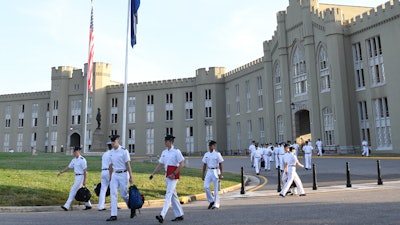Virginia Military Institute — the nation’s oldest state-supported military college — is making changes to its student-run honor court, so that cadets accused of lying, cheating, stealing or other expulsion-worthy offenses receive fair trials.
According to The Washington Post, the honor court has a history of expelling Black cadets at a disproportionately high rate. Between the fall of 2017 and the spring of 2020, Black cadets represented 43% of those expelled for honor code violations, despite the fact that they comprised  VMI Photo by H. Lockwood McLaughlin
VMI Photo by H. Lockwood McLaughlin
The reforms to the student court come after a state-ordered investigation into racism and sexism at VMI last year. Results of the investigation, conducted by the law firm Barnes & Thornburg, had summarized the 183-year-old institution as being "run by white men, for white men" and as sustaining "systems that disadvantage minority and female cadets and faculty." Among other recommendations, the investigation's final report advised VMI to "consider changing" its policy of allowing convictions without unanimous verdicts by student juries.
While VMI isn't removing that policy, it is expanding the size of its student jury, meaning that guilty verdicts will require nine out of 11 jury votes instead of the previously five of seven, reports the Post. In a 70-page progress report, VMI wrote that having more jurors "increases the Court’s burden of proof and further reduces the potential (real or perceived) of forcing a guilty verdict based on insufficient or circumstantial evidence."
In another change, VMI will allow cadets to use pro bono attorneys during their trials. For the past ten years, the college hasn't allowed lawyers to represent cadets due to earlier complaints that "professional litigators prosecuted the system itself and that only affluent students could afford them," reports The Post. Now the college will provide a list of pro bono lawyers who are willing to work with cadet defendants and defense advocates; however, attorneys will only be able to observe and consult with their client or defense advocate instead of arguing the case themselves.
The college also added that it would begin tracking "key demographic data" to "monitor the fairness of the system," reports The Post. This and the other changes to the court will go into effect in August 2022.













